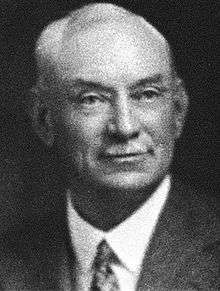Thomas William McDonald
Thomas William McDonald (1869 – 14 August 1968), sometimes known as Colonel Mac, was a United Party Member of Parliament in New Zealand.
Thomas William McDonald | |
|---|---|
 | |
| Member of the New Zealand Parliament for Wairarapa | |
| In office 14 November 1928 – 2 December 1931 | |
| Preceded by | Alexander McLeod |
| Succeeded by | Alexander McLeod |
| Personal details | |
| Born | 1869 Tasmania, Australia |
| Died | 14 August 1968 New Zealand |
| Political party | United |
| Spouse(s) | Amy Gertrude McDonald |
Biography
| New Zealand Parliament | ||||
| Years | Term | Electorate | Party | |
| 1928–1931 | 23rd | Wairarapa | United | |
McDonald was born in 1869[1] in Tasmania.[2] From 1905 to 1907, he was Mayor of Lower Hutt.[2][3]
He was married to Amy Gertrude McDonald and in 1914, they were living in Dunedin's Queen Street.[4] Prior to World War I, he was Lieutenant Colonel and in charge of the Otago Infantry Battalion, which trained at Tahuna Park in Dunedin.[5] During the war, he rose to the rank of colonel, and was sometimes known as Colonel Mac. Having fought in Egypt, he returned to New Zealand before the end of the war due to sickness. He was one of the driving forces behind having a clubhouse established in Dunedin for the Returned Services' Association.[2]
The death of Walter Powdrell triggered a by-election in the Patea electorate. McDonald announced his intention to stand for the Reform Party and travelled to Hawera. The Reform Party chose Edwin Dixon, the Mayor of Hawera, as their official candidate, and it was said that Clutha Mackenzie was the party's second preference. Consequently, McDonald left again without contesting the by-election.[6][7] During 1922, it became known that McDonald intended to move to Wellington and he received a requisition to stand in the Wellington East electorate in the 1922 election. He was one of four candidates, stood as an independent, and came third with some 18% of the votes.[8] He was unanimously elected by the United Party to contest the Wairarapa electorate in the 1928 election,[9] and he defeated the incumbent Alexander McLeod of the Reform Party.[10] In the 1931 election, McLeod in turn defeated McDonald.[10]In 1935 he stood again for the Wairarapa seat as the newly formed Democrat Party's candidate. He placed third out of four candidates.[11]
McDonald died in 1968.[1]
Notes
- Wilson 1985, p. 214.
- "A Clash of The Clans". NZ Truth (1204). 27 December 1928. p. 4. Retrieved 27 November 2012.
- McGill 1991, pp. 119–120.
- "Cenotaph Record". Auckland War Memorial Museum. Retrieved 27 November 2012.
- Byrne 1921, p. 6.
- "The Patea Seat". Hawera & Normanby Star. XLI. 15 March 1921. p. 7. Retrieved 21 April 2015.
- "Patea By-Election". The New Zealand Herald. LVIII (17734). 19 March 1921. p. 6. Retrieved 21 April 2015.
- Hislop, J. (1923). The General Election, 1922. Government Printer. p. 4. Retrieved 6 December 2014.
- "The United Party". The Evening Post. CVI (78). 10 October 1928. p. 11. Retrieved 27 November 2012.
- Wilson 1985, pp. 214, 217.
- The General Election, 1935. National Library. 1936. pp. 1–35. Retrieved 3 August 2013.
References
- Byrne, Arthur Emmett (1921). Official History of the Otago Regiment, N.Z.E.F. in the Great War 1914–1918. J. Wilkie & Company. Retrieved 27 November 2012.CS1 maint: ref=harv (link)
- McGill, David (1991). Lower Hutt – The First Garden City. Petone, New Zealand: The Lower Hutt City Council. ISBN 1-86956-003-5.CS1 maint: ref=harv (link)
- Wilson, James Oakley (1985) [First ed. published 1913]. New Zealand parliamentary record, 1840–1984 (4 ed.). Wellington: V.R. Ward, Govt. Printer. OCLC 154283103.CS1 maint: ref=harv (link)
| New Zealand Parliament | ||
|---|---|---|
| Preceded by Alexander McLeod |
Member of Parliament for Wairarapa 1928–1931 |
Succeeded by Alexander McLeod |
| Political offices | ||
| Preceded by Orton Stevens |
Mayor of Lower Hutt 1901–1905 |
Succeeded by Thomas Alexander Peterkin |